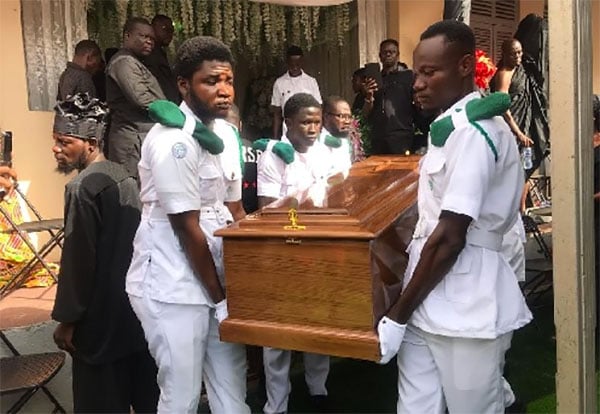Teddy Osei, a name synonymous with the vibrant sounds of Afro-pop and the pioneering band Osibisa, was laid to rest on April 5, 2025, in Kumasi, Ghana. His final journey commenced at his family residence in Chiriapatre, where mourners paid their last respects during a body viewing. The solemn procession then moved to the grand St. Peter’s Cathedral Basilica near Fante Newtown for a burial mass, a fitting tribute to a man whose music resonated with millions across the globe. The cathedral’s hallowed halls echoed with the memories of his extraordinary life, as family, friends, fans, and dignitaries gathered to celebrate the legacy of this musical giant. The occasion was a poignant blend of grief and celebration, acknowledging the profound loss while simultaneously honoring the indelible mark Osei left on the world of music.
Born Francis Kwabena Osei on December 17, 1935, Teddy Osei’s life was a testament to his unwavering passion for music. From a young age, he displayed a natural aptitude for rhythm and melody, ultimately mastering a range of instruments, including the saxophone, drums, and vocals. His multifaceted musical talent laid the foundation for his future success as a bandleader and composer. Osei’s formative years were steeped in the rich musical traditions of Ghana, influences that would later become integral to the unique sound of Osibisa. He honed his skills by performing in local bands, gradually gaining experience and refining his craft, while simultaneously absorbing the diverse musical landscape surrounding him. These early experiences would shape his vision for a band that could bridge the gap between African rhythms and a global audience.
In 1969, Osei’s vision came to fruition with the formation of Osibisa, a band that would become synonymous with the burgeoning Afro-pop genre. The band’s name, derived from the Ga language phrase “Osibisaaba,” meaning “criss-cross rhythms that explode with happiness,” perfectly encapsulated their vibrant and eclectic sound. Osibisa’s music was a fusion of traditional Ghanaian highlife, West African rhythms, rock, jazz, and funk, creating a unique and infectious blend that resonated with international audiences. Under Osei’s leadership, Osibisa became a global phenomenon, breaking down cultural barriers and introducing the world to the rich tapestry of African music. Their innovative sound paved the way for countless other Afro-pop artists, establishing Osei as a true pioneer and visionary.
Among Osibisa’s most enduring hits was “Woyaya,” released in 1971. The song, with its uplifting message of hope and perseverance, became an anthem of unity and optimism, resonating with listeners around the world. The memorable refrain, “We are going… Heaven knows where we’re going… We know we will,” encapsulated the song’s spirit of unwavering faith and forward momentum, themes that resonated deeply with a global audience seeking inspiration and connection. “Woyaya,” along with other Osibisa classics like “Sunshine Day” and “Dance the Body Music,” cemented the band’s place in music history and solidified Osei’s legacy as a gifted composer and songwriter. These songs transcended cultural boundaries, becoming anthems of hope and celebration that continue to inspire generations.
The impact of Teddy Osei’s musical contributions extended far beyond the catchy melodies and infectious rhythms. Osibisa’s music played a crucial role in bringing African culture and music to the forefront of the global stage. Their success shattered stereotypes and challenged preconceived notions about African music, paving the way for greater recognition and appreciation of the continent’s diverse musical traditions. Osei’s innovative fusion of musical styles demonstrated the power of cross-cultural collaboration, highlighting the richness and complexity of African musical heritage. His work helped to bridge the gap between different cultures, fostering greater understanding and appreciation for the artistry emanating from the African continent.
Teddy Osei’s legacy lives on not only through his music but also through the lives he touched and the inspiration he provided to countless musicians. He is survived by his three daughters, Matilda, Agnes, and Shanta, as well as several grandchildren and great-grandchildren. Their presence at his funeral served as a poignant reminder of the personal impact of his life, extending beyond his public persona as a musical icon. His family, along with the countless fans and fellow musicians whose lives were touched by his work, will carry his legacy forward, ensuring that the vibrant rhythms and spirit of Osibisa continue to inspire and uplift for generations to come. Teddy Osei’s contribution to the world of music is immeasurable, leaving an indelible mark on the cultural landscape and enriching the lives of millions across the globe.














